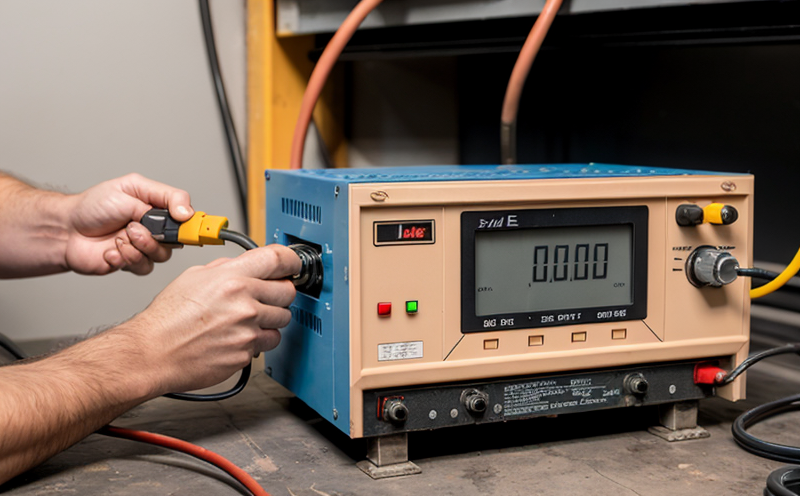JEDEC JESD22-B111 Die Drop Test Characterization Testing
The JEDEC JESD22-B111 standard is designed to evaluate the mechanical robustness of semiconductor dies by simulating a drop from a specified height. This test is critical for ensuring that the die can withstand accidental drops without sustaining damage, which could potentially lead to functional failure. The test involves placing a die on a rigid surface and dropping it onto another rigid surface. The impact energy is then measured using an impact tester.
The JEDEC JESD22-B111 standard specifies that the test should be conducted at room temperature (23 ± 5°C) under normal atmospheric conditions with a relative humidity of 40-60%. The drop height is typically set between 1.0 and 2.0 meters, depending on the size and type of die being tested. This ensures that the test accurately reflects real-world scenarios where dies may be subject to accidental drops.
The testing apparatus used in this process includes a rigid surface for placing the die, an impact tester capable of measuring the drop height and impact energy, and a digital camera or similar device to capture images before and after the test. The die is carefully positioned on the rigid surface, ensuring that it is centered and stable.
The acceptance criteria for this test are based on visual inspection and functional testing post-impact. If any visible cracks or fractures are observed in the die, it fails the test. Additionally, if the die does not pass a subsequent functional test, it also fails the drop test. This ensures that only robust dies meet the requirements of the JEDEC JESD22-B111 standard.
The significance of this testing lies in its ability to identify weak points in the design and manufacturing process of semiconductor dies. By identifying these weaknesses early on, manufacturers can implement corrective actions to improve product quality and reliability. This not only enhances consumer trust but also reduces warranty costs and potential recalls.
When conducting JEDEC JESD22-B111 tests, it is important to follow the standard's specifications closely to ensure accurate results. The testing apparatus must be calibrated regularly to maintain precision, and all personnel involved in the testing process should undergo training to understand the nuances of the test procedure.
The industry has seen significant advancements in semiconductor technology, with smaller and more complex dies becoming increasingly common. These advancements have made the JEDEC JESD22-B111 test even more critical as it ensures that these advanced dies can still withstand accidental drops without sustaining damage.
Understanding the implications of this test for quality managers, compliance officers, R&D engineers, and procurement professionals is crucial. Quality managers rely on accurate testing to ensure product consistency and reliability. Compliance officers use this test to verify adherence to industry standards, while R&D engineers leverage it to refine designs and manufacturing processes. For procurement teams, ensuring that suppliers meet these stringent standards helps maintain high-quality components in their supply chain.
Applied Standards
The JEDEC JESD22-B111 standard is widely recognized for its rigorous approach to evaluating the mechanical robustness of semiconductor dies. Compliance with this standard ensures that the tested products meet the highest industry standards, thereby enhancing their reliability and durability.
- JEDEC JESD22-B111: This standard specifies the procedures for determining the mechanical robustness of semiconductor devices by subjecting them to a drop test.
- ASTM E494-03(2016): This additional ASTM standard provides supplementary guidance on testing methods and apparatus, which can be valuable when implementing JEDEC JESD22-B111 tests.
The use of these standards ensures that the testing process is consistent across different laboratories and facilities. It also facilitates comparisons between test results from various sources, providing a reliable benchmark for quality assurance.
Scope and Methodology
The scope of JEDEC JESD22-B111 testing includes evaluating the mechanical robustness of semiconductor dies under drop conditions. The methodology involves placing a die on a rigid surface, dropping it onto another rigid surface from a specified height, and measuring the impact energy. This test is particularly useful for assessing the durability of small, complex semiconductor devices.
The first step in conducting this test is to prepare the specimen by ensuring that all dies are clean and free from any foreign materials. Once prepared, the die is placed on a rigid surface. The drop height is then set according to the specifications outlined in the JEDEC JESD22-B111 standard.
The impact tester is used to measure the drop height accurately. After dropping the die, the impact energy is recorded using the impact tester. A digital camera or similar device captures images of the die before and after the test for visual inspection.
Following the test, a functional test is conducted on the die to ensure that it still functions correctly post-impact. If any visible cracks or fractures are observed in the die, or if the die fails the subsequent functional test, it is deemed non-compliant with the JEDEC JESD22-B111 standard.
The methodology ensures that the testing process is both accurate and consistent, providing reliable results for quality control purposes. This consistency is crucial for maintaining high standards in semiconductor manufacturing and ensuring product reliability.
Industry Applications
- In automotive electronics: Ensures robustness of microcontrollers and sensors used in critical safety systems.
- In consumer electronics: Guarantees durability of processors and memory chips in portable devices.
- In medical devices: Verifies the reliability of control units and sensors in patient monitoring equipment.
- In aerospace: Evaluates the mechanical integrity of avionics components under extreme conditions.
The JEDEC JESD22-B111 test is essential for ensuring that semiconductor dies meet stringent quality standards. By simulating real-world drop scenarios, this test helps manufacturers identify and address potential weaknesses in their products early on, leading to improved product reliability and customer satisfaction.





